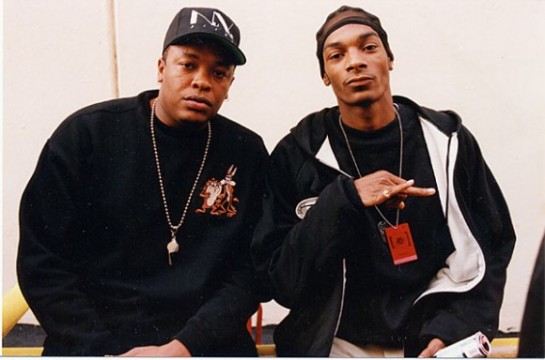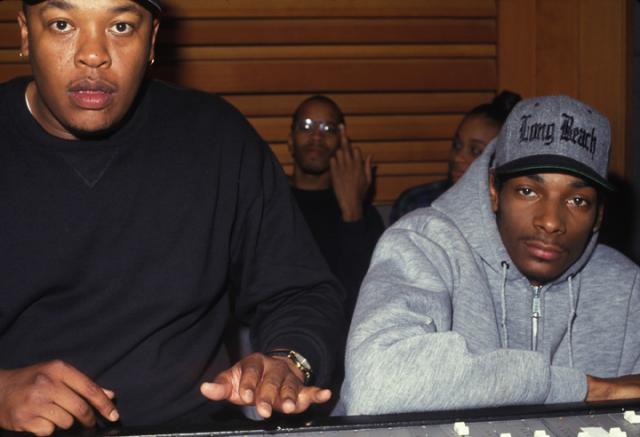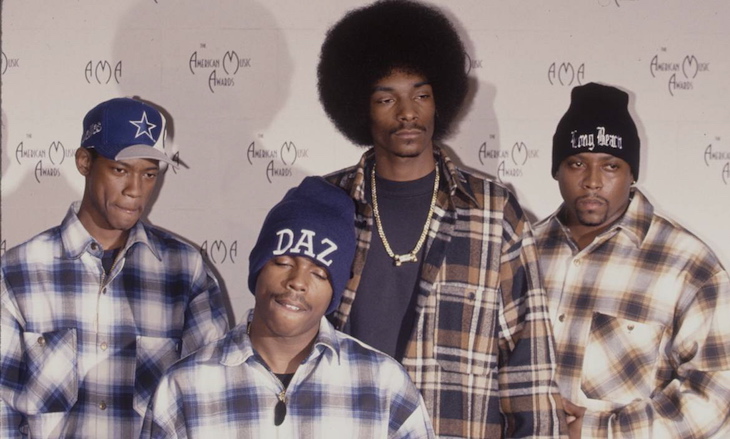For years before the Rodney King beating, hip hop had been talking about the way young black males were being mistreated by the police departments in their neighborhoods. With the exception of the fans of the art, and those living in those communities - their cries were widely ignored. The most well known track about the relationship, N.W.A.’s “Fuck The Police”, got the attention of the federal government, who would send a cease and desist letter to the groups' record label. The news of this only made the group more popular, and to make matters worse, their music was becoming more and more popular...in the SUBURBS.
As their popularity and influence grew, frustration between the citizens and the authorities did as well. Group members became the target of police scrutiny. There’s the well-known story of Eazy-E being pulled over by police during the filming of a video. During the shoot, he was hanging out the sunroof. The officer on the scene made no effort to understand that this was something being done for entertainment purposes, showed no respect for the groups' artistic integrity, and issued a citation. I’m sure if given the opportunity he would’ve made an arrest because simply, that’s what the police do. They turn the difficult into the impossible; there’s a lack of understanding on their part. So the seeds have long been planted, and now the frustrations of a generation could be heard by the masses.
NWA sold millions of records, but soon after the release of their first album, ‘Straight Out Of Compton’, they were given contracts and $40,000 checks by co-owner (along with Eazy E) of Ruthless Records, Jerry Heller. While all the groups members did not hesitate to sign, Ice Cube who had written the majority of the debut was wary. The fact that they were all paid equally, even as the work load was not equally distributed seemed unfair to him. He asked for additional time before signing, wanting to have a lawyer look over the contract before moving forward. At the time, on paper NWA was not a “group”. Signing the contract would have made that official. He was given an ultimatum and opted to part ways with his group mates, who by this time had become close friends.
Upon parting ways with NWA, Ice Cube would head to New York to record his major label debut, and to his understanding there was no bad blood between him and his former NWA brethren. With the absence of the groups lead writer, D.O.C., a talented lyricist signed to Ruthless, already with the classic album “No One Does It Better” under his belt, filled the role. D.O.C.'s own recording career at the time was over, due to an injury he sustained to his vocal chords in a car accident shortly after the release of his debut album. The group would go on to achieve even more success with “Niggaz4Life”, while viewed by some to not be as politically charged as “Straight Out Of Compton”, in my opinion its musically superior, and in certain respects D.O.C. was a more effective writer than Cube. He and Dre’s chemistry seemed more organic, and at that time, production by Dre was approaching the G Funk era he would soon help make famous, and reshape the sound of west coast hip hop forever.
As the end of 1991 approached, the crew dubbed the “world’s most dangerous group” was now, for lack of a better term, finished. Ice Cube, the original lead writer, now solo became one of the biggest stars in hip hop. Releasing 2 hit albums (AmeriKKKas Most Wanted & Death Certificate), and an EP (Kill At Will) released shortly after NWA’s 2nd album. In response to the many disses thrown his direction on '100 Miles & Running' EP, and Niggaz4Life, Cube recorded one of the most scathing diss records in the history of hip hop. On the track titled “No Vaseline” he questioned the credibility of the remaining members of NWA both on the streets, and talent wise. He also made insinuations about the nature of Eazy and Heller’s relationship.
While at the height of their popularity, the same frustrations Ice Cube had about the way business was handled, now became the concern of Dre. Despite producing the majority of the Ruthless discography (D.O.C. & Eazy E debuts, along with the first two NWA albums) Dre was still only receiving a small percentage. It was the advice of D.O.C., that would prove to be what truly confirmed his thoughts of parting ways with NWA and Ruthless Records for good. Suge Knight, who at the time was D.O.C.'s bodyguard was attempting to expand his label, Death Row Records, and while Dre may have been underpaid for his contributions at Ruthless Records, he wasn’t struggling financially by any stretch. He liked the entrepreneurial spirit of Suge, and decided to go into business with him as a co-owner of Death Row Records. So here you have Dre, the label’s main producer and lead writer D.O.C exiting simultaneously. It was a hard blow to Ruthless Records both creatively and financially. A blow they would never fully recover from.
Dre’s decision to sign the contract that Ice Cube declined would prove to be an obstacle in cleanly breaking away from Ruthless. He was still in fact an artist on their roster, and contractually there was nothing he could do about it - he'd signed the contract. Instead of going to court and going through the legal process, Suge opted to pay a visit to Eazy. The events that followed have long been disputed by on both sides to a certain extent. What we do know is Eazy E signed the release papers on Dre’s contract, and he was free to sign with whomever he chose. But following the “meeting” with Suge, Eazy E and Jerry Heller filed a lawsuit against Suge and Dr Dre for breach of contract. Claiming that he had been physically assaulted by Suge and others, and forced to sign the contract, under the guise that Suge was willing to hurt whomever it took to get the signature. Eazy claimed he signed under duress.
As Dre prepared to begin recording his solo debut, he recruited the help of a new rapper from the streets of Long Beach, Snoop Doggy Dogg, whom he had been introduced to by his step-brother, Warren G. The success of their first collaboration, “Deep Cover” created anticipation for Dre’s solo debut, ‘The Chronic’. During the recording of the album he had a great deal of inspiration to draw from, the Rodney King beating more or less confirmed everything NWA had previously rapped about. The album would be recorded in just 6 weeks in the summer of '92, in the aftermath of the riots. The frustrations that caused the uprising inevitably found its way into the lyrics and themes of the album.
While ‘The Chronic’ is often remembered as one of the first hardcore albums to cross over to a pop audience, it was not for a lack of substance. The album in itself is no doubt, ‘Gangsta Rap’, but Dre’s production merged the sounds of Parliament, Funkadelic, Roger Troutman etc, and created what would be known as ‘G-Funk’. The melodies were infectious, it allowed the 1st single, “Nuthin But A G Thing” to reach #2 on the Billboard Hot 100 chart, the highest for a ‘Gangsta Rap’ single. Both the track and the accompanying video celebrated the more peaceful side to LA in months following the riots. From picking up Snoop in Long Beach, to attending a cookout, and Snoop having a little too much to drink (and smoke). You see everything from a man preparing BBQ with an apron on, and a 9mm in the small of his back, to a stuck up female getting an Olde English shower.
The album was released on December 15th of 1992, a little over 7 months after the riots, to rave reviews. It would peak at #3 on the charts, and become one of the most influential albums in the history of the genre. While it established Dre as a solo artist, and a proven hit maker behind the boards it also showcased Snoop’s talent and potential, and helped catapult the 22 year old to hip hop superstardom in the 12 months that would follow.
As a whole ‘The Chronic’ is much more than a party, it was also Dr Dre’s chance to fire back at Ruthless Records. He wastes no time in doing so, as the album's intro features Snoop and RBX sending threats to all who oppose Death Row and Snoop humorously taunts Eazy & Heller. The opening track “Fuckin Wit Dre”, which also would become the 2nd single released, features disses to everyone from Eazy (who is portrayed in the video as nothing short of a of a house negro), Luke, and also a subliminal is sent towards Ice Cube (“Got the chrome to the side of his White Sox hat“), as there had been no clear reconciliation since his diss on NWA when Dre was still a part of the crew. While it didn’t reach the top 5 like “G Thing”, it was still extremely successful reaching the Top 10 on the Billboard Hot 100.
The following track “Let Me Ride” (would later become the third and final single) samples Parliament’s, “Mothership Connection”. While the theme is more or less the same, it's an updated version of the original sentiment, Dre riding through the streets of LA in his drop top 64’ Impala. The video served as the point of peace between Dre and Cube, who makes a cameo. While Dre spit’s the lines:
“Just another mothafuckin day for Dre so I begin like this
No medallions, dreadlocks, or black fists
It's just that gangster glare, with gangster raps
That gangster shit, that makes the gang of snaps,
Word to the mothafuckin streets”
It’s both true and false, while the themes of the album as a whole never quite reach an Afrocentric message by any stretch, it is just as revolutionary as a “conscious” hip hop album, it just has a gangsta overtone
(“I'ma say this and I'ma end mine
If you ain't down, for the Africans here in the United States, period point blank..
If you ain't down for the ones that suffered in South Africa from apartheid and shit.
Damnit you need to step your punk ass to the side
And let us brothers, and us Africans, step in and start puttin some FOOT, in that ass!!”)
Using sound bites from the summit held outside of First AME church in the hours following the verdict, footage shot by director Matty McDaniels, that would eventually become the documentary ‘Birth Of A Nation 4/29/92’. Clips from news coverage of the riots can also he heard before Dre takes direct aim at white supremacy, right out the gate, “The Day The Niggaz Took Over” plays like a soundtrack to the first 4 days of the uprising. It’s a celebration of the mayhem that would follow, and a war cry of sorts. Rallying the troops after being disgusted by the verdict, he goes on a shopping spree throughout the city, taking whatever he wants, and daring anyone from law enforcement to question his actions, upon which he threatens violence to the fullest extent. It’s one of the most passionate songs about the riots, RBX spits that “the Pro Black, refuse to go”, in response to the police trying to disperse crowds. The song perfectly captures the spirit of many as they set efforts towards destroying any and everything in the city, seen as part of the system that oppresses people of color on a daily basis.
The menacing production helps set the tone, and forces you to visualize the subject matter. It’s almost as if Dre was recording the track as everything was happening, in real time. Anchormen (and women) report of fires and people attacking police. Further sound bites make mentions of blacks still feeling like slaves after the verdict, and once again the justice system refuses to punish those who brutalize the black citizens. Refusing to “turn the other cheek”, this is just as big of a ‘fuck you’ to the system as anything he had previously recorded while still a member of NWA. Making mention of the gang truce, he speaks about everyone coming together for one common cause, to fuck shit up.
(“So, all of you Africans..
All of you Africans that wanna do things that's workin for other people
Y'all need to open your own business
Save your money,
Quit payin mothafuckas with jheri curls
Quit payin mothafuckas with perms
Save your money, start your own business.
So these little Africans, will have places to work.
This is our future right here, this out future right here {*applause*}
[This some shit! The new generation is on! The new generation!]
Hey, I'ma tell you right now..
If I have to die today, for this little African right here to have a future.
I'm a dead mothafucka”)
The statement speaks for itself, “Lil Ghetto Boy”, (which samples the classic Donny Hathaway track) is probably the most thought provoking track on the album. It holds up the mirror to the community and questions the actions of the gangstas in the streets, as well as the youth who have grown up watching them, and are now emulating the lifestyle. Snoop reflects on the time he spent behind the bars, and questions whether or not GOD himself can even save him from the direction in which his own fate seems to be pulling him. It’s a display of victory, in the face of defeat.
The album has a range, where there’s songs as spirited as “Lil Ghetto Boy” and “The Day The Niggaz Took Over”, to the humor and light heartedness of “Deez Nuts”. The entire Death Row, roster make contributions vocally, and also behind the boards. Daz and Warren G, while not receiving proper credit, are said to have helped Dre produce tracks (and in some case produced them on their own). Introducing the hip hop world to stars such as Nate Dogg, and Kurupt. RBX makes quite a few appearances on the album, as well as The Lady Of Rage who at the time was the newest signee to Death Row.
Reminding listeners that while the police are sworn enemies, they are not the only people Dre is concerned with attempting to harm him. “A Nigga Witta Gun”, is like the streets version of an ode to the 2nd Amendment. “Rat-Tat-Tat-Tat” is in the same vein, except the nigga with the gun wants you to know that neither he nor Snoop will ever “hesitate to put a nigga on his back”. “Lyrical Gang Bang”, is just classic West Coast Gangsta rap, also serves as the first time the country heard Rage and Kurupt. RBX discusses the true viscous nature that gang violence has caused the community, and the paranoia it created in a young mans psyche. Speaking about hearing gunshots every night, and becoming a nervous wreck in the process. It’s also one of 2 tracks on the album that doesn’t feature a verse from Dre.
“Stranded On Death Row” is one of the best crew songs of the 90s, once again Kurupt shines, shows his lyrically ability. The aggressive style he honed on the streets of Philadelphia before relocating to LA as a teenager are on clear display. Everyone gets a piece of the pie, RBX once again spits another strong verse, and his contributions on the latter half of the album have sort of been lost in the shuffle, which is a shame. He truly is a talented lyricist, and he has a voice that cannot be confused. Once again, Snoop Dogg still manages to steal the show, as good as X, and Kurupt are, Snoop’s melodic rhymes just have a memorable feel to them. It sucks you into his every word.
The album closes out much like it begins, with Dre taking one last shot at Eazy. He explains the story of what happened that lead to his exit from Ruthless, and also discussing the lawsuit that Eazy filed (and later won) against Death Row on the illegal release of Dre from his Ruthless contract. While others take actual shots at silly women they’ve had relations with, “Bitches Ain’t Shit” is funny in ways, but its also honest in its content, Snoop tells the story of being sent to jail for an incident with a female, returning home after 6 months only to find her having sex with his cousin, Daz.
For those that didn’t live through the uprising in LA, ‘The Chronic’ serves as 1 of the 2 most descriptive depictions of the climate of inner city LA in the time following the Rodney King verdict. Its politically charged, lyrically potent, and musically innovative. The ‘G Funk’ style would go onto become a signature of west coast ‘gangsta rap’ for the remainder of the decade, and to a certain extent still to this day. 'The Chronic' isn't an album simply about weed, it's a soundtrack to resistance.






